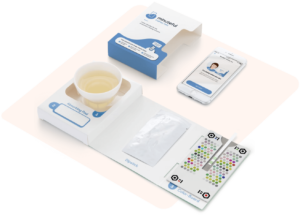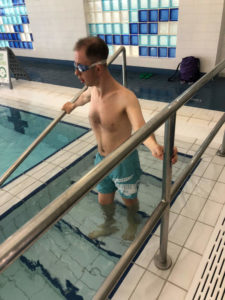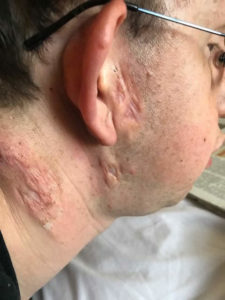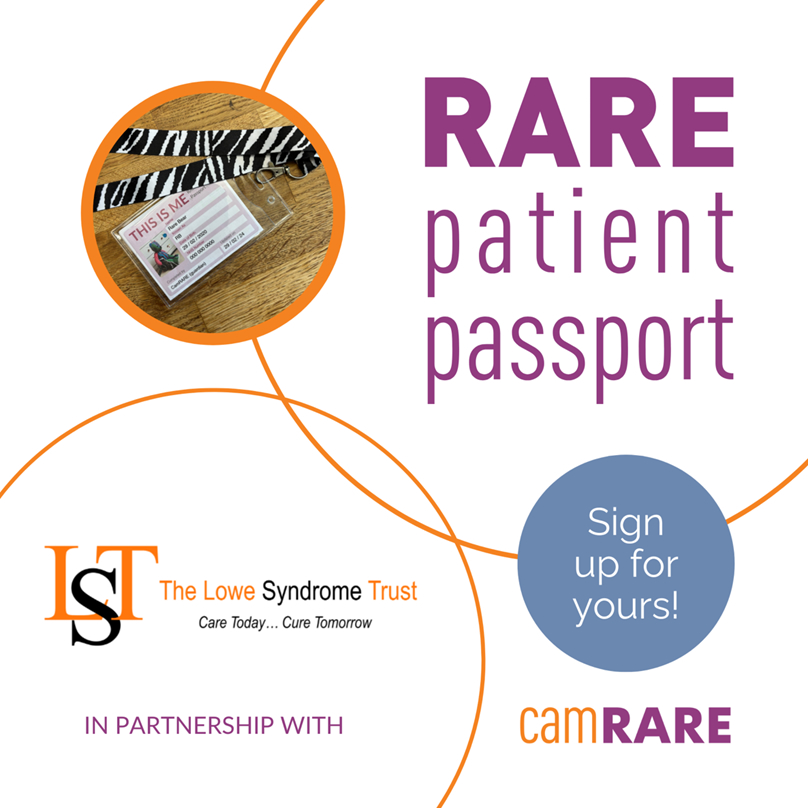Information
NHS GP and Family Info
Lowe Syndrome Diagnosis

Lowe Syndrome is a condition characterised by children born with cataracts in both eyes, with other symptoms that become evident later in life.
The condition is caused by a gene variation and should be confirmed by a DNA test. There is also a condition known as Dents2 that has a similar variation but does not result in cataracts but has a similar kidney condition.
The diagnosis for Lowe Syndrome is by having a DNA test for the OCRL variation. This is normally at birth and requested by your doctor available under the NHS Genomic Medicine Service.
You can request a NHS passport click here to download the Lowe CamRare form and get help to fill it in from your Doctor or hospital. Once you have completed a hospital passport from one hospital, you DO NOT need to complete any other hospital passport.
Your Doctor should ensure a patient with Lowe Syndrome is on the NHS Learning disabilities register. Patients over the age of 14 on the register are entitled to a free annual health check.
NHS Kidney Testing
 Your GP or kidney consultant may recommend the kidneys are checked regularly, typically each year, requiring a blood test and a urine test. The blood test is to check the blood platelets and eGFR filtration ratio and the urine test for ACR kidney shedding proteins. To correct the kidney condition your doctor may prescribe supplements to prevent weak bones such as Calcium carbonate and vitamin D supplements – usually calcitriol (Rocaltrol) or alfacalcidol (One-Alpha).
Your GP or kidney consultant may recommend the kidneys are checked regularly, typically each year, requiring a blood test and a urine test. The blood test is to check the blood platelets and eGFR filtration ratio and the urine test for ACR kidney shedding proteins. To correct the kidney condition your doctor may prescribe supplements to prevent weak bones such as Calcium carbonate and vitamin D supplements – usually calcitriol (Rocaltrol) or alfacalcidol (One-Alpha).
The blood test will need a blood sample taken, normally from a hand or arm, and may be carried out at your GP or hospital. For an example of an NHS blood test result for a healthy Lowe Adult, showing typical abnormal levels for blood platelet and creatinine, please click here. Please note some printouts highlight the abnormal results with a message others are like the example.
The urine test is normally carried out at the GP or hospital. Your doctor may also be aware for certain kidney conditions the NHS is also piloting the use of a kidney test that can be carried out yourself at home, using a urine sample and a smartphone app.
This kidney testing service provides a semi-quantitative albumin to creatinine ratio (ACR) test using Healthy.io’s Minuteful Kidney early detection service, using a home test sent to your address. Using the smartphone App, the results are fully integrated to the NHS Electronic Medical Record (EMR) so the results are available for your doctor to review.
To see a comprehensive presentation on Lowe syndrome kidney tests, please see Dr Brewer’s presentation on the Lowe family Facebook.
NHS Eye Services
 Lowe Syndrome patients will normally have cataracts removed shortly after birth and will be eligible for NHS eyecare services to prescribe and help with the cost of high prescription glasses. Some Lowe patients can also be prescribed special contact lenses. As a result of the cataract removal there is likely to a risk of glaucoma and so regular checkups for eyesight and eye pressure will be needed and prescriptions for glaucoma such as Latanoprost.
Lowe Syndrome patients will normally have cataracts removed shortly after birth and will be eligible for NHS eyecare services to prescribe and help with the cost of high prescription glasses. Some Lowe patients can also be prescribed special contact lenses. As a result of the cataract removal there is likely to a risk of glaucoma and so regular checkups for eyesight and eye pressure will be needed and prescriptions for glaucoma such as Latanoprost.
As for anyone, physical exercise is essential for health, and swimming is recommended. For swimming special high prescription lens swimming goggles can now be supplied by most opticians, such as Specsavers.
In most cases during the cataract removal operation on a baby, both lenses must be completed removed and it is not possible to have a lens replacement. High prescription glasses and treatment for glucoma will be required and this entitles you to free NHS eyecare and to claim for the cost of glasses.
The prescription will normally be prescribed by your local NHS hospital eyecare services rather than a private optician, however now most opticians such as Specsavers can also perform eye tests, prescribe and supply suitable high-prescription lens frames and swmming goggles.
The glasses are likely to require a high prescription (more than 14 diopter) and so quality for the highest category of eyecare voucher. Click here to claim NHS eyecare vouchers.
If you paid for your glasses without using a voucher you should be entitled to claim a refund. To do this you need to download, print and return an HC5(O) refund form with your original receipt (including the amount you paid and the date of payment) and your optical prescription.
People with Lowe Syndrome are prone to breaking thier glasses, typically the frames, and so it would be a good idea to buy a spare frame that the lenses can be fitted into and ordered again if the spare frame is broken. Click here to see NHS vouchers for replacement glasses.
Dental Services
A person with Lowe Condition may also have an unusual palette and teeth and like anyone else – clean thier teeth and have regular dental checkups. See article.
A lowe person should be entitled to free NHS dental services with an HC2 certificate under the NHS Low income scheme (LIS).
Use this form HC5(D) to reclaim the cost of any NHS dental charges.
Epilepsy / Seizures
Epilepsy is used to describe unprovoked seizures that occur more than 24 hours apart. For many, the seizures happen so rarely that medication is not prescribed.
Research has shown that approximately 50% of Lowe patients present seizures, so carers do need to be aware and prepared. There is no specific seizure type.
Bruising, Bones and Cysts
 Lowe symptoms may also include weak bones, bruising due to mild blood platelet disorder and skin cysts.
Lowe symptoms may also include weak bones, bruising due to mild blood platelet disorder and skin cysts.
Children are prone to broken bones like wrists and bruise easily that in one case was mistaken by a social worker as child abuse (see story here).
Lowe Family Membership
We would encourage families to become a member of the Lowe Syndrome Association
There are Lowe family social media sites we would encourage families to use:
- There is a Lowe Syndrome family forum on Facebook administered by the LSA USA Lowe Family Facebook Page
We are working to setup a single patient registry and database. Meanwhile we recommend that you register with the following databases:
- Click here for the Lowe Syndrome patient register form by CoRDS (Coordination of Rare Diseases at Sanford), which is a centralised international patient registry for all rare diseases.
- Click here for the Dents community and click here to see the Rare X DCP Data collection form for Dents. At present this should only be for Dents ie no cataracts.
- Click here for the Citizen Health database.
The LSA USA has partnered with Citizen Health that is complimentary to CoRDS and Citizen Health databases, to get all genetic data into one comprehensive database of OCRL mutations for researchers. Lowe Syndrome can be selected, and Languages English and Spanish are supported, more will be added (Mandarin Chinese, French, German, Portuguese, Arabic, Turkish). We recommend families get their DNA mutation letter and upload this and key medical reports. As UK (international) you register with your email or via google, and provide proof of power of attorney and can upload DNA and health records as pdf’s and share a link to the documents
The Rare Patient Passport – now customised for the Lowe Syndrome community
We’re excited to announce our partnership with CamRARE (Cambridge Rare Disease Network) to bring the “This Is Me” Rare Patient Passport to individuals and families in the Lowe Syndrome Trust community.
This free, downloadable passport is a powerful communication tool designed to help people living with rare conditions share essential information quickly and easily with healthcare professionals, emergency services, educators, and more. It’s especially valuable in unfamiliar settings where understanding rare conditions like Lowe Syndrome is critical.
Getting a DNA mutation test for Lowe Syndrome
The DNA test to identify the gene mutation for Lowe Syndrome requires Whole Genome Sequencing.
DNA testing is available FREE through the NHS but is also available privately. An example of a private testing service is Dante, and costs from £700. Dante offers basic and comprehensive DNA test. The comprehensive test goes beyond the report offering you a chance to discuss your results with a rare disease specialist through an online consultation. Nebula also offers private DNA testing, which is the Ultra Deep package.
Your NHS GP cannot directly request a test but can request a DNA analysis through a referral to a rare disease genetics specialist at your local hospital. An example diagnosis letter showing the gene mutation is shown here.
Lowe Syndrome is characterised by bi-lateral cataracts and would be requested under The NHS testing criteria for rare diseases as R31. See reference document page 104.
The specialist would request the test from one of the following genetics NHS genetics testing centres.
The NHS national genomic testing service is delivered through a network of seven Genomic Laboratory Hubs (GLHs), each responsible for coordinating services for a particular part of the country. See Link https://www.england.nhs.uk/genomics/genomic-laboratory-hubs/
- Central and South Genomic Laboratory Hub led by Birmingham Women’s and Children NHS Foundation Trust
- East Genomic Laboratory Hub led by Cambridge University Hospitals NHS Foundation Trust
- North West Genomic Laboratory Hub led by Manchester University NHS Foundation Trust
- North Thames Genomic Laboratory Hub led by Great Ormond Street Hospital for Children NHS Foundation Trust
- South East Genomic Laboratory Hub led by Guy’s and St Thomas’ NHS Foundation Trust
- South West Genomic Laboratory Hub led by North Bristol NHS Trust
- North East and Yorkshire Genomic Laboratory Hub led by The Newcastle upon Tyne Hospitals NHS Foundation Trust
Information Links
- LSA what is Lowe Syndrome
- LSA medical tests for Lowe Syndrome
- Kidney – Effect of bicarbonate tablets
- Lowe Syndrome Cysts
- Lowe blood platelet disorder
- Lowe Syndrome Trust Medical Handbook – this is now outdated, and currently being work on.

